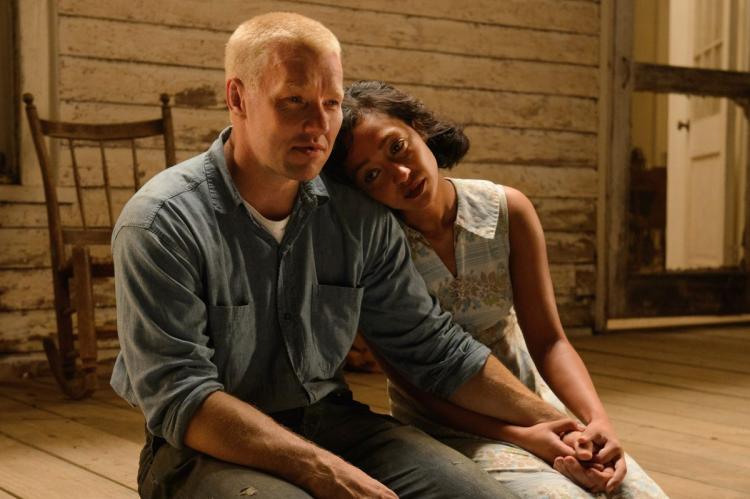
 Moving with a subtle yet powerful energy, Jeff Nichols' Loving
emerges as one of the best dramas to come out in 2016. It's
based on a true story of a forbidden marriage that ended up becoming
an important case decision, Loving v. Virginia, for the
Supreme Court of the United States.
Moving with a subtle yet powerful energy, Jeff Nichols' Loving
emerges as one of the best dramas to come out in 2016. It's
based on a true story of a forbidden marriage that ended up becoming
an important case decision, Loving v. Virginia, for the
Supreme Court of the United States.
Set starting in 1958, Joel Edgerton (Midnight
Special, Jane Got a Gun) and Ruth Negga
(Warcraft,
World War Z) star as taciturn
Richard and soft-spoken Mildred, an interracial couple (white
man/black woman) who, upon learning the news that she is pregnant,
elope from their home in rural Virginia at a time of segregation to
Washington D.C., until authorities in their native state, where such
unions are banned by law (a jailable offense, in fact).
Unfortunately, the authorities catch wind and the couple are taken
away to jail. Facing more prolonged prison time, their
well-respected lawyers plea bargains a deal that avoids jail time on
the condition that the Lovings leave the state immediately and never
return together for the next 25 years or be incarcerated. They
try to make it in more tolerant urban existance, but they miss their
country home, and want to raise a family there, but to do so will put
everything at risk, unless someone takes up the fight for their civil
liberties in the American court system, which is sparked by a letter
Mildred sends to Robert Kennedy during the height of the civil rights
movement.
It's a sensitive film about a topic that could have been blown up by
bombast in the wrong hands, so a good deal of credit goes to its
writer-director by always keeping the movie feeling authentic, focused
and very plausible throughout, putting the characters on the forefront
more so than the weight of their legal dilemmas. Another
director might have ratcheted up the acts of racism on the part of the
authorities, or have made Richard and Mildred Loving martyr-like
figures, but Loving always comes across as grounded, and the
Lovings as real, complex people conflicted about wanting to live their
lives as a married couple who don't want to be noticed at all for
their union. Also missing are the powerhouse "Oscar moments" or
crying or anguish on the part of the actors, which is important in
watching the film as capturing the spirit of the times much more so
than in trying to push major political and sociological themes on its
audience through grandstanding and manufactured conflict.
Jeff
Nichols (Mud,
Take Shelter) is nothing if not a noble filmmaker, which may disappoint some
people going into this film expecting a glossy, tension-filled
Hollywood treatment of these real-life events. The major court
case is mostly kept off of the screen in favor of showing the Lovings
in their home life, and the results of the verdict come through on a
telephone conversation that we don't even hear both sides of. As
such, there isn't the kind of Oscar-bait showpieces of people
grandstanding to make (now) populist political arguments to rouse
audiences to stand up and applaud. Instead, the low-key approach
is meant to have us quietly contemplate how far society has come in
between the times of segregation and now, and to surmise how much
better it is to foster unity and love among one another rather than
revert back to a path of racial, ethnic, and gender divides.
But all of this would not come to fruition if not for the solid work
turned in by the lead actors, Joel Edgerton and Ruth Negga, who
deliver understated but thoroughly believable performances as the
humble couple whose only real significance outside of the landmark
court case that would be to come is that they wanted to be married to
each other while also living out in their country home in Virginia,
not harming anyone. Though they are both actors of note, they inhabit
their fine-tuned personas so completely (including great accents from
an Australian and Irish/Ethiopian actor, respectively, that we no
longer see them as the complex Joel and Ruth, always commonly simple but
dignified Richard and Mildred -- a true test of performances and
characterizations well done.
Probably a sizable percentage of the audience going into Loving
will not know that its title is referring to the names of the main
characters caught in the drama of the legalities of their marriage.
I'm sure that Nichols' choice is intentional, given that this is a
victimless crime pushed forward by prejudicial people in an era that,
one would hope, will never exist again in this country, where two
people in love want to make that commitment of love by getting legally
married. It's the act of "loving" is the main purpose of the
union, and the act of "hating" and separation is the real crime,
pulling families apart because of outdated, racist beliefs that
continue to bubble up in a residual fashion in many parts of this
country to this day. Loving is a realistic reminder of
America's troubled racial divide, putting forward the Lovings, not as
heroes, but as victims of seeing each other without the layers of
prejudice and hate that others have been taught since the era of
African enslavement.
The film's end credits features the phrase, "Virginia is for Film
Lovers", denoting not only the appreciation on the part of the
filmmakers for the state's allowance to locales and benefits for those
studios seeking to film there, but also makes a nod to the irony that
"Virginia is for Lovers" has been their advertising motto for many
years, despite the history shown within this film.
Qwipster's rating:







©2016 Vince Leo

 Moving with a subtle yet powerful energy, Jeff Nichols' Loving
emerges as one of the best dramas to come out in 2016. It's
based on a true story of a forbidden marriage that ended up becoming
an important case decision, Loving v. Virginia, for the
Supreme Court of the United States.
Moving with a subtle yet powerful energy, Jeff Nichols' Loving
emerges as one of the best dramas to come out in 2016. It's
based on a true story of a forbidden marriage that ended up becoming
an important case decision, Loving v. Virginia, for the
Supreme Court of the United States.